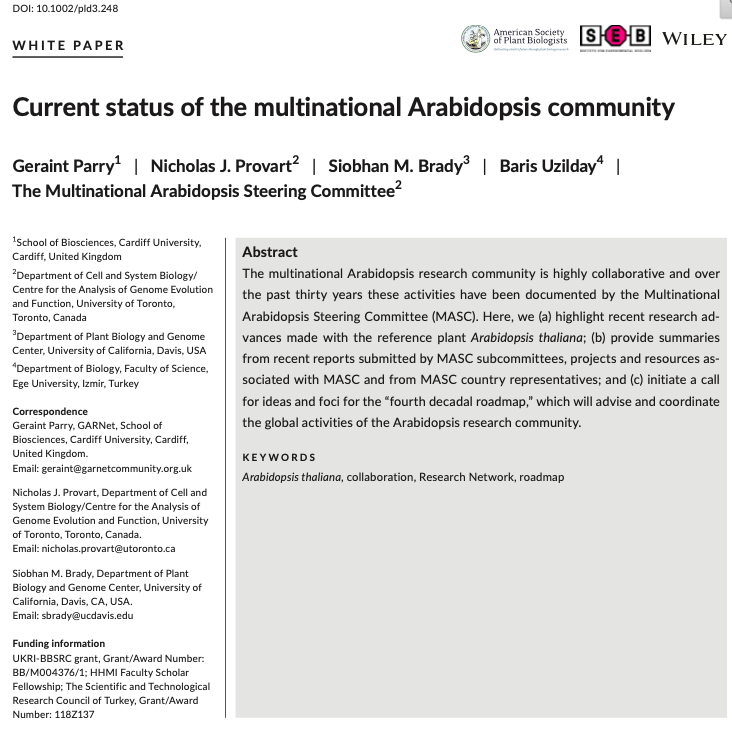Cheng-Hsun Ho, This email address is being protected from spambots. You need JavaScript enabled to view it.,">This email address is being protected from spambots. You need JavaScript enabled to view it., Agriculture Biotechnology Research Center, Academia Sinica
October 9th 2020
In recent years plant/agricultural researchers in Taiwan have focused several important global challenges, such as intensifying climate change, depletion of natural resources. These problems make it urgent to undertake the agricultural transformation and industrial upgrading. Thus, advancing agricultural modernization and innovation are important. In 2018, weather was better than earlier years in Taiwan, making it a bumper harvest year for agriculture. The invested money for basic research and advancing agricultural translation research in Taiwan are several billions of US dollars, which was a new high over the last 20 years.
Currently, scientific researchers in Taiwan more than 70% using Arabidopsis as a model plant to first test ideas and theories, and then translating to agriculture research. The main mission for all plant researchers is 1) to discover important mechanisms and to solve biological critical questions, and 2) to create edge-cutting and innovative technologies and to translate it into an industry. For example, we solve a long-standing question of plant biology on protein import machinery into chloroplasts, where photosynthesis is taking place. A key part identified to link the outer and inner membrane translocons of chloroplast. Evolutionary analyses further suggest that this chloroplast protein import machinery in a plant is from a bacterial protein secretion system.
We have already completed many foundational works, seen many historic changes, and achieved a number of successes in 2019 and believe that we can continue and stay strong and successes in 2020.
New Resources and Software tools available for Arabidopsis Researchers that have been initiated or funded in 2018 or early 2019
1. Plants of Taiwan (http://tai2.ntu.edu.tw)
2. Orchidstra 2.0 - A Transcriptomics Resource for the Orchid Family (http://orchidstra2.abrc.sinica.edu.tw/orchidstra2/index.php)
3. Taiwan Biobank (https://www.twbiobank.org.tw/new_web/)
4. Database of Native Plant in Taiwan (http://www.hast.biodiv.tw/Announce/projectContentE.aspx)
5. Discover Plants of Taiwan (http://taiwanplants.ndap.org.tw)
6. Herbarium of Taiwan Forestry Research Institute (http://taif.tfri.gov.tw/cht/)
7. Forestry and Resource Conservation, National Taiwan University (http://ntuf.cc.ntu.edu.tw)
8. Taiwan Rice Insertional Mutants Database
Conferences, Workshops and Outreach events
1. NPAS Seminar: 2019 Asia-Pacific drosophila neurobiology conference
2. Stem cells & developmental biology mini-symposium -division of life sciences
3. AS-NIH-TMU Joint Neuroscience Symposium
4. IBC Biophysics mini-symposium - From Physics to Diseases
5. Mini-symposium on protein structure and function
6. Joint Meetings: Abcam Epigenetics Conference and 14th Asia Epigenome Meeting (AEM) / 3rd Taipei Epigenetics and Chromatin Meeting (TECM)
7. The 17th international symposium on rice functional genomics (ISRFG 2019)
8. Radiocaesium in Agricultural Environment and Internal Radiation dose from Foods in Fukushima after the Nuclear Accident of 2011
9. Application of Organic or Inorganic Materials to Soils for Development of Sustainable Agriculture
10. 2019 IMB Symposium
11. 2020 UW Madison-Academia Sinica Stem Cell & Regenerative Medicine Symposium: Biology, Technology & Regulation
12. The 12th Shang-Fa Yang memorial lecture
13. The 13th Shang-Fa Yang memorial lecture
Selected Publications
Angkawijaya, A.E., Nguyen, V.C., and Nakamura, Y. (2019). LYSOPHOSPHATIDIC ACID ACYLTRANSFERASES 4 and 5 are involved in glycerolipid metabolism and nitrogen starvation response in Arabidopsis. New Phytol 224, 336-351.
Cho, H.Y., Lu, M.J., and Shih, M.C. (2019). The SnRK1-eIFiso4G1 signaling relay regulates the translation of specific mRNAs in Arabidopsis under submergence. New Phytol 222, 366-381.
Hsu, C.W., Lo, C.Y., and Lee, C.R. (2019). On the postglacial spread of human commensal Arabidopsis thaliana: journey to the East. New Phytol 222, 1447-1457.
Jang, G.J., Yang, J.Y., Hsieh, H.L., and Wu, S.H. (2019). Processing bodies control the selective translation for optimal development of Arabidopsis young seedlings. Proc Natl Acad Sci U S A 116, 6451-6456.
Li, Y., Xu, X., Lee, M.H., Chu, M.W., and Chien, C.L. (2019). Observation of half-quantum flux in the unconventional superconductor beta-Bi2Pd. Science 366, 238-241.
Michniewicz, M., Ho, C.H., Enders, T.A., Floro, E., Damodaran, S., Gunther, L.K., Powers, S.K., Frick, E.M., Topp, C.N., Frommer, W.B., et al. (2019). TRANSPORTER OF IBA1 Links Auxin and Cytokinin to Influence Root Architecture. Dev Cell 50, 599-609 e594.
Pecher, P., Moro, G., Canale, M.C., Capdevielle, S., Singh, A., MacLean, A., Sugio, A., Kuo, C.H., Lopes, J.R.S., and Hogenhout, S.A. (2019). Phytoplasma SAP11 effector destabilization of TCP transcription factors differentially impact development and defence of Arabidopsis versus maize. PLoS Pathog 15, e1008035.
Wang, T., Schreiber, C., Elbaz, D., Yoshimura, Y., Kohno, K., Shu, X., Yamaguchi, Y., Pannella, M., Franco, M., Huang, J., et al. (2019). A dominant population of optically invisible massive galaxies in the early Universe. Nature 572, 211-214.
Wong, M.M., Bhaskara, G.B., Wen, T.N., Lin, W.D., Nguyen, T.T., Chong, G.L., and Verslues, P.E. (2019). Phosphoproteomics of Arabidopsis Highly ABA-Induced1 identifies AT-Hook-Like10 phosphorylation required for stress growth regulation. Proc Natl Acad Sci U S A 116, 2354-2363.
Zhang, W., Wang, G., Xu, Z.G., Tu, H., Hu, F., Dai, J., Chang, Y., Chen, Y., Lu, Y., Zeng, H., et al. (2019). Lactate Is a Natural Suppressor of RLR Signaling by Targeting MAVS. Cell 178, 176-189 e115.
Major Funding Sources
• Ministry of Science and Technology, Taiwan
https://www.most.gov.tw/?l=en
• Academia Sinica
https://www.sinica.edu.tw/en)




